Curated David Whyte Poems
Rich in the imagery of nature and deep metaphors, these poems of David Whyte invoke the contradictory emotions of love, loss, grief and hope.

About the Poet
Poet David Whyte was born on November 2, 1955. His Anglo-Irish cultural heritage, a degree in marine zoology, affinity to nature, proficiency in languages, love for travel, and a unique habit of taking literature from shadows to light often make his works in poetry and philosophy themed around "the conversational nature of reality".
His literature is not confined to a place or a theme but is enjoyed globally. After more than six decades worth of contributions to the poetry grimoire, he continues to make the reader introspect and analyze the world through his poems. His prose burbles many rivers of literature inherited from his Irish-Yorkshire parenthood. He first published a collection of poems in 'Songs for Coming Home'. Some of his works are 'The Heart Aroused: Poetry and the Preservation of the Soul in Corporate America, Consolations: The Solace, Fire in the Earth, etc. David Whyte’s poems are enjoyed by poetry connoisseurs across the world.
"Poetry is a language against which you have no defenses."
-David Whyte
Poems by David Whyte
With several published works under his belt, the poems of David Whyte range to express the complexity of several eternal issues and phenomena. In this article, we've curated some of the best poems of David Whyte. We hope you enjoy this curation as much as we do.
1. The Opening of Eyes
Listen to the Poem The Opening of Eyes
That day I saw beneath dark clouds,
the passing light over the water
and I heard the voice of the world speak out,
I knew then, as I had before,
life is no passing memory of what has been
nor the remaining pages in a great book
waiting to be read.
It is the opening of eyes long closed.
It is the vision of far-off things
seen for the silence they hold.
It is the heart after years
of secret conversing,
speaking out loud in the clear air.
It is Moses in the desert
fallen to his knees before the lit bush.
It is the man throwing away his shoes
as if to enter heaven
and finding himself astonished,
opened at last,
fallen in love with solid ground.
The poem ‘Opening of Eyes’ is full of potent metaphors that express several comparisons to our existence.
With the simple act of pausing and observing, of being open to gaze underneath any "black clouds" at what emerges shining through, there is also an inward opening of eyes that occurs. The poem asks the question, "Are our eyes open?" .'Out loud in the clear air,' are we allowing our hearts to speak? Can we fall even more deeply in the sea of love with the firm ground beneath us and the miracles right in front of us, or are we too blind to see them? This voyage of life through "many rivers" meets the "pilgrim" or the house of one's religious belief.
2. Enough (Extract)
Enough.
These few words are enough.
If not these words, this breath.
If not this breath, this sitting here.
This opening to the life
we have refused
again and again
until now.
Until now.
In this poem, which is widely circulated in the media, David Whyte asks a simple question – What if this moment alone was sufficient? What effect would that have?
The poet has rightfully expressed in the simplest compositions that sometimes we reach the final degree of our tolerance and reach a point where we feel – ‘Enough is enough’.
3. Everything is waiting for you
Anger and frustration are dangerous companions in life. However, they are often followed by poor mental health in the long run. The poet has made a sincere effort to express one of the greatest problems of the modern world through this poem.
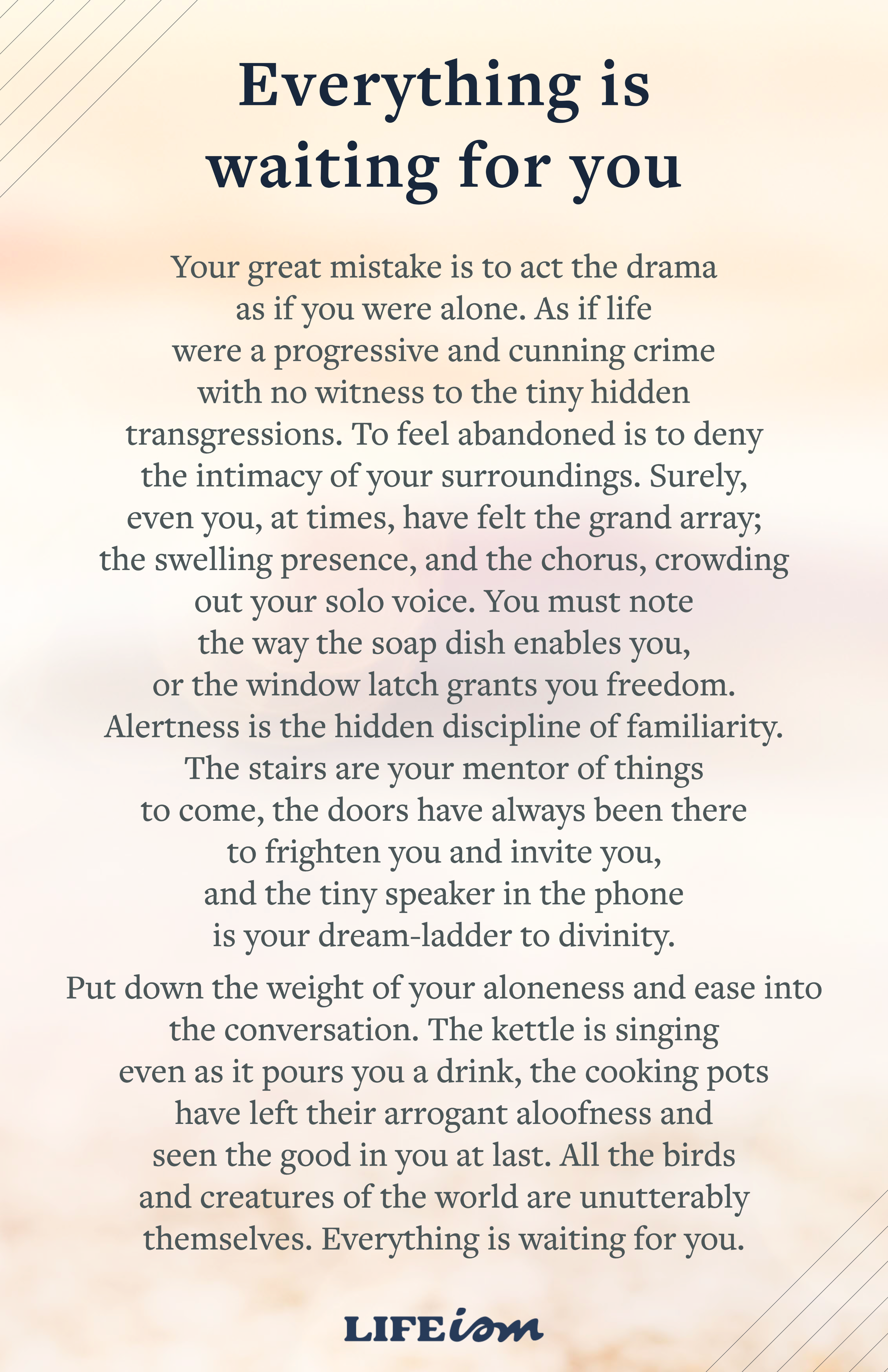
Your great mistake is to act the drama
as if you were alone. As if life
were a progressive and cunning crime
with no witness to the tiny hidden
transgressions. To feel abandoned is to deny
the intimacy of your surroundings. Surely,
even you, at times, have felt the grand array;
the swelling presence, and the chorus, crowding
out your solo voice. You must note
the way the soap dish enables you,
or the window latch grants you freedom.
Alertness is the hidden discipline of familiarity.
The stairs are your mentor of things
to come, the doors have always been there
to frighten you and invite you,
and the tiny speaker in the phone
is your dream-ladder to divinity.
Put down the weight of your aloneness and ease into the
conversation. The kettle is singing
even as it pours you a drink, the cooking pots
have left their arrogant aloofness and
seen the good in you at last. All the birds
and creatures of the world are unutterably
themselves. Everything is waiting for you.
After the pandemic, we have all felt the need for and importance of having a support system. Lockdowns for our safety suddenly made us lonely. We erroneously believed that we are alone. Our individualistic tendencies of living in nuclear families intensified these feelings.
David Whyte believes that thinking that we are alone, is as good as denying the world around us (made of other living and non-living things). It is as good as believing that just because a human is not present, the world is not with us and that we are alone. We disregard (rather ungratefully) the cushion of other living and non-living beings that give us comfort and make our lives what they are today.
The poet David Whyte goes on to say that there are people who can help us if we ask them, there is a community somewhere willing to guide us in our time of need. The poet’s plea is not a striking song to unite our forces and march against any oppression, however, it is a simple poem of empathy that asks us to believe in the cohesive strength of humanity, to share our burdens, and to be ourselves in the face of danger.
Readers' reaction to the poem
The people's comments for this poem on onbeing.org are a testament to the poem's success. Several readers of books of prose bought copies of his works. Compared to other poems; this poem did not require an esoteric audience. We all have felt lonely at some point in our lives.
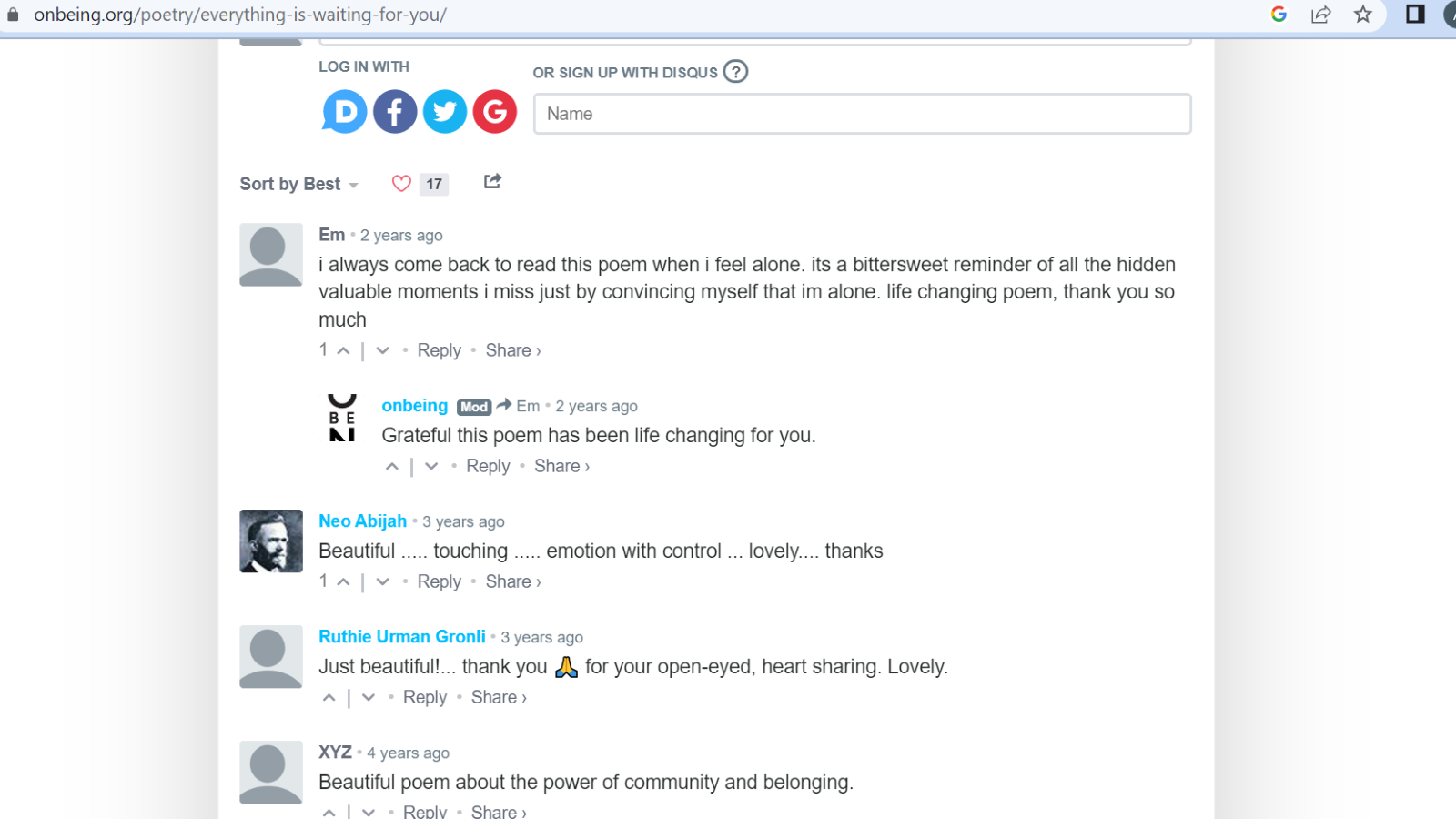
Read our article on – Don't quit poem.
4. The Well of Grief
Those who will not slip beneath
the still surface on the well of grief,
turning down through its black water
to the place we cannot breathe,
will never know the source from which we drink,
the secret water, cold and clear,
nor find in the darkness glimmering,
the small round coins,
thrown by those who wished for something else.
In this brilliant poem, David Whyte talks about grief and hope. He describes the feeling of loss and grief as being under the water in a dark, cold place where it is difficult to breathe.
But unless we experience this grief and loss, we will never know where hope and gratitude come from. Because in the darkness of the water, we will see the shining coins each an unrequited wish for something. And when we see them we will realize the blessings we already have in our lives despite the grief. It reminds us that we could be underwater in grief for many of these wishes. But we are blessed in many respects. The glimmering coins are also an image of hope in the poem.
5. The journey
Above the mountains
the geese turn into
the light again
Painting their
black silhouettes
on an open sky.
Sometimes everything
has to be
inscribed across
the heavens
so you can find
the one line
already written
inside you.
Sometimes it takes
a great sky
to find that
small, bright
and indescribable
wedge of freedom
in your own heart.
Sometimes with
the bones of the black
sticks left when the fire
has gone out
someone has written
something new
in the ashes of your life.
You are not leaving
you are arriving.
Listen to the Poem The Journey on YouTube
David Whyte wrote this poem when a friend was going through a divorce. He uses many nature-based metaphors to tell us that sometimes, we need to look at things from a different perspective. And unless we are willing to change that perspective (in this case, a divorce), we will not see it.
He goes on to say that sometimes, that shift of perspective is also required for us to see the small bright light of freedom in our hearts. And this process of finding ourselves may look like an end. However, it is only the end of a relationship – the end of a chapter in your life. But we focus so much on the end that we fail to see that it is also a beginning of a new one as well.
6. Learning to walk
Walked out this morning
into a broad green garden
with the rising sun in my eyes
and the first hint of the day’s heat
touching my face,
feeling as broad as the garden
and young as the day
and soaking up the heat
in my black tee-shirt,
walked straight forward
out of the gate,
through the wood,
along the river,
toward the mountain
and thought of the future
I could make in the world
if I walked toward it
like this,
with my face toward the hills
and my eyes full of light
and the earth sure
and solid beneath me,
walking on
with a fierce anticipation,
and a faithful expectation,
with the sun and the rain
and the wind on my skin…
- From RIVER FLOW: New and Selected Poems
Learning to walk is another one of David Whyte’s motivational poems. The poet paints beautiful scenery in front of our eyes, and he makes us relive our best morning moments. In this poem, the metaphor or philosophy is in the name of the poem itself. The poet compares finding confidence and positive power in our life to the baby’s first footsteps. This innocent comparison and the strong message of deriving power through nature have been expressed in this poem.
This ferocity of expression and the poet’s encouraging words to help us find our footing makes this poem a true motivator.
7. Just Beyond Yourself
Just beyond
yourself.
It’s where
you need
to be.
Half a step
into
self-forgetting
and the rest
restored
by what
you’ll meet.
There is a road
always beckoning.
When you see
the two sides
of it
closing together
at that far horizon
and deep in
the foundations
of your own
heart
at exactly
the same
time,
that’s how
you know
it’s the road
you
have
to follow.
That’s how
you know
it’s where
you
have
to go.
That’s how
you know
you have
to go.
That’s
how you know.
Just beyond
yourself,
it’s
where you
need to be.
- from The Bell and the Blackbird (Extract)
What would happen if we all persistently went beyond ourselves? What if, instead of avoiding the unknown out of fear, we jumped into it? What if we expressed our truths in a confrontation rather than holding our tongues to avoid it? This poem summons the fire within to lead a braver life.
The poet expresses his philosophy and jest by using the word 'just.’ According to him, all that we need to achieve requires ‘just’ a bit more effort. The poet asks us to keep our eyes on our goal, forget the past and focus on the steps to reach our destination that is ‘just’ beyond our struggles.
8. Self Portrait
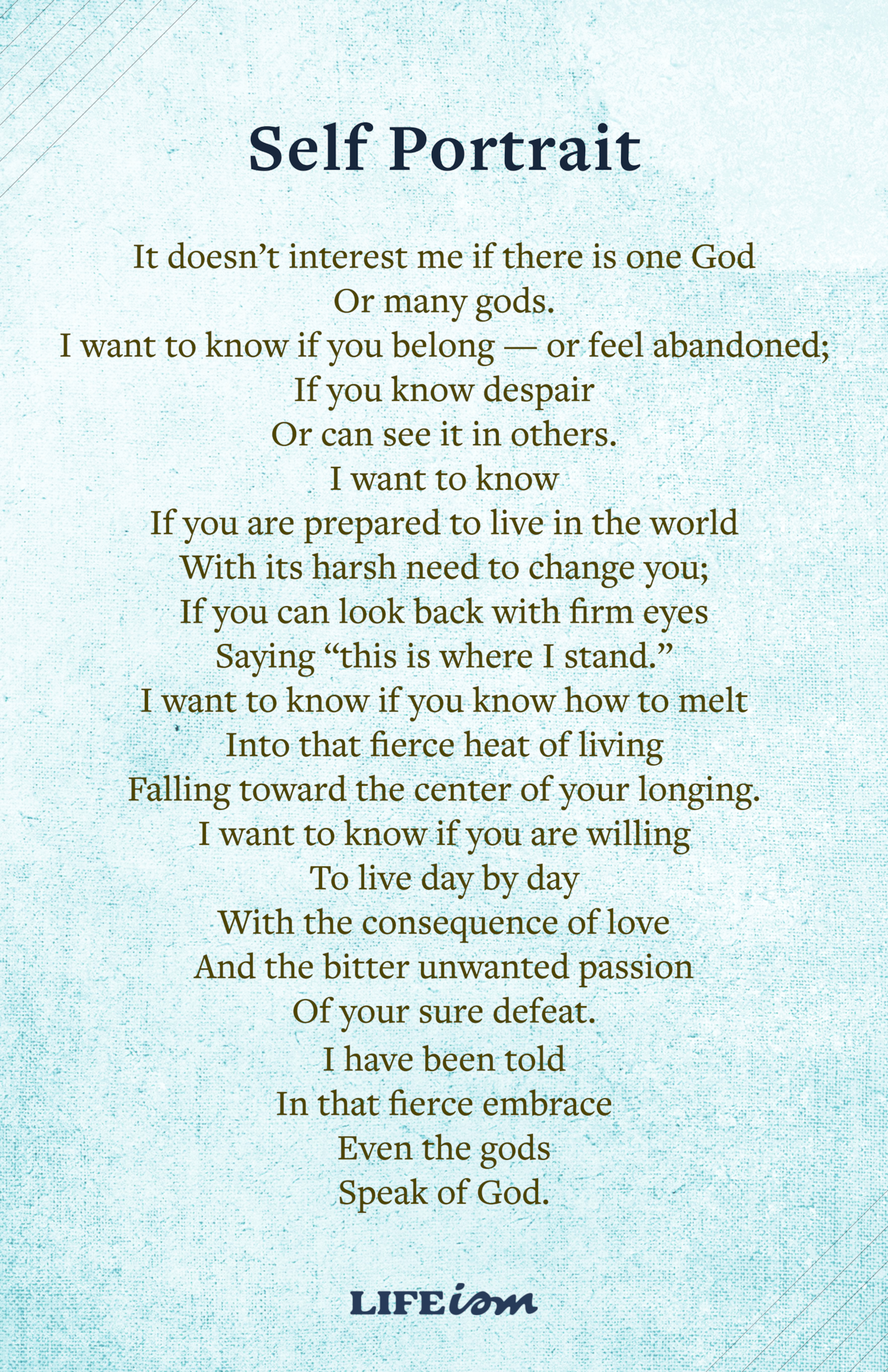
It doesn’t interest me if there is one God
Or many gods.
I want to know if you belong — or feel abandoned;
If you know despair
Or can see it in others.
I want to know
If you are prepared to live in the world
With its harsh need to change you;
If you can look back with firm eyes
Saying “this is where I stand.”
I want to know if you know how to melt
Into that fierce heat of living
Falling toward the center of your longing.
I want to know if you are willing
To live day by day
With the consequence of love
And the bitter unwanted passion
Of your sure defeat.
I have been told
In that fierce embrace
Even the gods
Speak of God.
The last poem of this article is a beautiful conclusion to all the messages David Whyte’s poems have given us so far. The poem ‘Self Portrait’ is one of the most beautiful compositions which borrows religion as a bible and a base for the main thought of betterment of humanity and improvement of society.
Christianity believes in one ‘God’ while there are several other religions that believe in multiple Gods. The poet does not discriminate based on religion on the other hand he prefers considering them as trivial facts while uniting people of different beliefs. The poem is a continuous interrogation of a commoner. Further, the poet is interested in knowing if the people feel abandoned or if they can sympathize with others' problems.
In the next few lines, the poet questions and asks us to all introspect. The poet knows that decisions have good as well as dire consequences. He also subtly conveys to us that if we do not work on our goals now, could we look back later at yesteryears and move ahead without disappointment, or could we simply be carrying the burden of regret throughout our life?
In the end, the poet again borrows biblical metaphors and pilgrim humor intended by saying ‘even the gods speak of God.’
Read our article on 10 Most Loved Amanda Lovelace poems
If you're looking for poetry that will strike a chord within you, then check out these poems from Amanda Lovelace.
lifeism.coDavid Whyte’s Poems have indeed been an inspiration for all. His wit, metaphors, Yorkshire linguistics, and diversity of subjects are clearly visible in the few samples presented in this article. Several of his works are published by poetry enthusiasts.
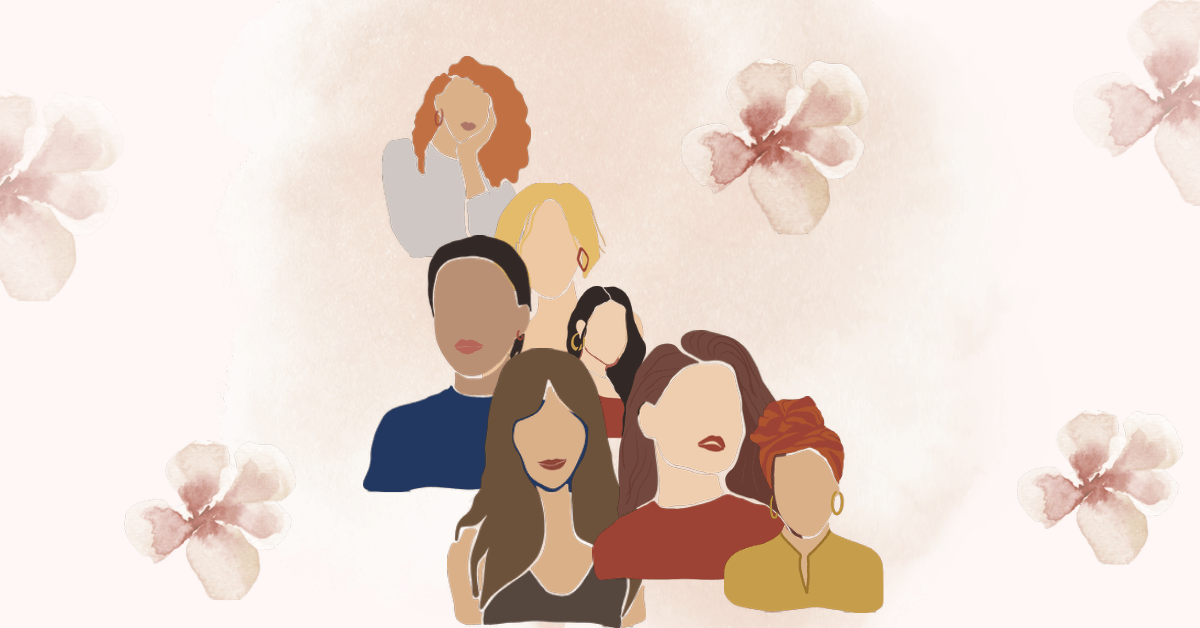



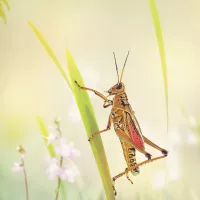

Comments